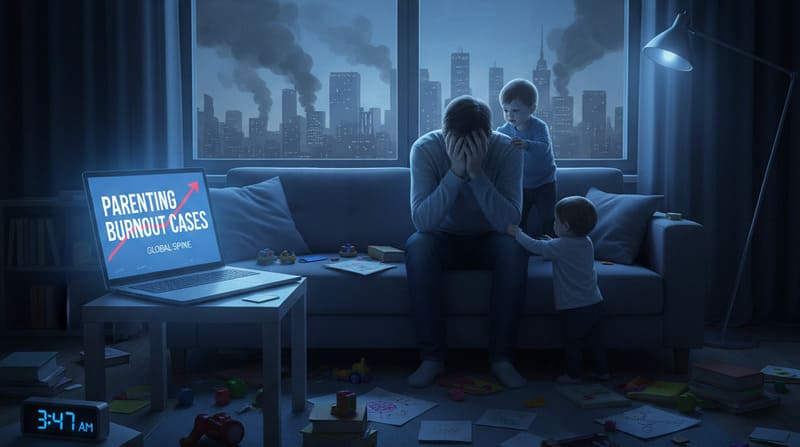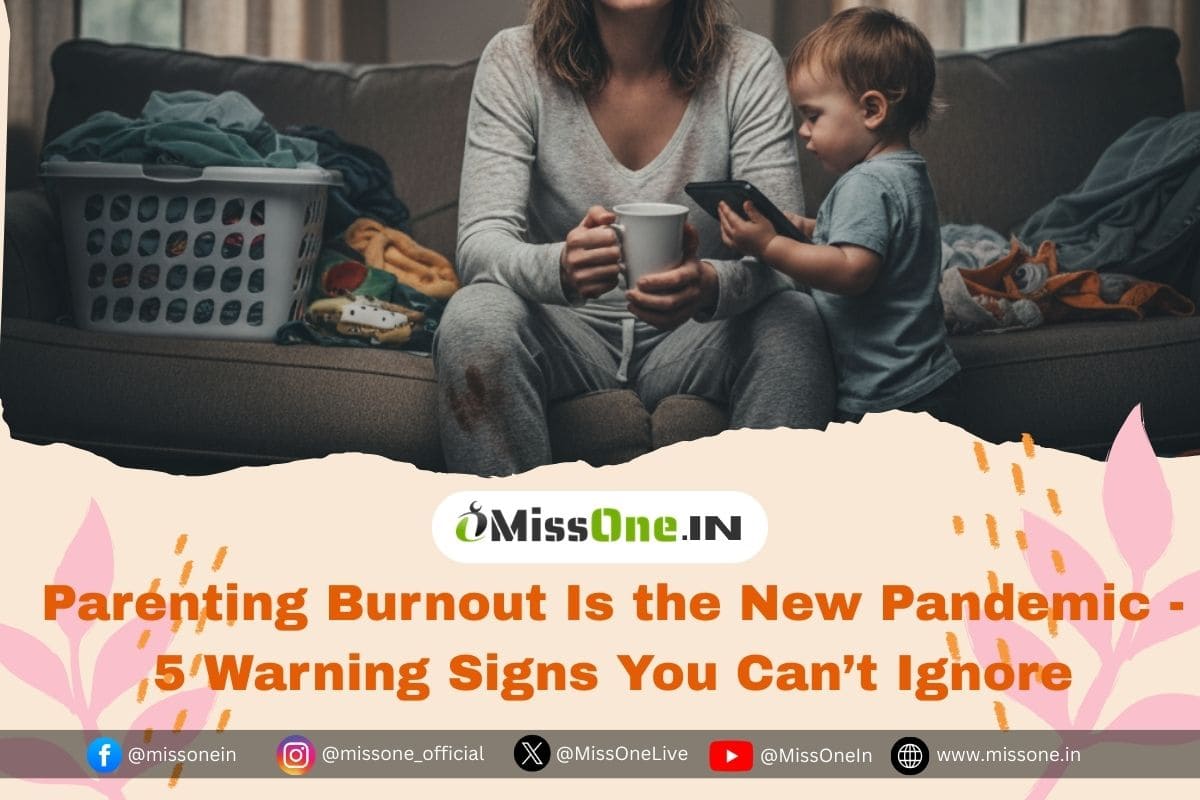Picture this: It’s 6:30 a.m., and your alarm has just gone off. The kids need breakfast, lunchboxes packed, and homework checked. Your phone pings with work emails, the school group chat is buzzing about a costume day you forgot, and your youngest has just spilled milk all over the table. You haven’t even had your coffee yet.
Parenting has always been exhausting, but today’s version feels different. It’s not just the physical tiredness it’s the relentless mental load of juggling work, school logistics, screens, extra curricular, and ever-rising expectations. Add to that a lack of real support, and it’s easy for the scales to tip into something more serious: parental burnout.
This isn’t just a trendy buzzword. It’s now a well-researched, measurable condition, with real consequences for both parents and children. And like any health issue, early recognition is key.
What Is Parental Burnout?
Researchers who created the Parental Burnout Assessment (PBA) describe it as a specific syndrome made up of four key elements:
- Exhaustion in your role as a parent.
- Emotional distancing from your children.
- Feeling fed up and losing enjoyment in parenting.
- A painful contrast between the parent you are now and the parent you used to be.
In simpler terms, it’s a state of chronic, role-specific exhaustion that changes how you feel and act as a parent.
It’s important to note that parental burnout is different from just being tired. Studies have shown that it can lead to more serious issues, such as child neglect, increased harshness in responses, and even thoughts of escape or self-harm in extreme cases.
The good news? Once you spot the signs, there are practical steps you can take to heal and rebuild your capacity.
Why Parenting Feels Harder Today
Let’s be honest, parenting has never been a walk in the park. But something has shifted in recent years.
- Technology has blurred boundaries: Work emails, school updates, and WhatsApp notifications now follow you everywhere, leaving little room to truly disconnect.
- High expectations everywhere: Social media is full of “perfect” parents who seem to effortlessly manage kids, careers, fitness, and a spotless home. It’s exhausting to even try to keep up.
- Reduced community support: In many places, the “village” it takes to raise a child feels more like a ghost town. Extended families live far apart, and neighbors are less connected.
- Changing roles: More dual-income households mean both parents carry heavy work responsibilities alongside parenting.
This constant pressure is like a slow leak, you might not notice it right away, but over time it can drain your emotional and physical energy until there’s nothing left to give.
5 Signs You May Have Parental Burnout
If you’re wondering whether you’ve crossed the line from “just tired” to “burned out,” here are the five major signs experts point to.
1. Overwhelming Exhaustion Tied Specifically to Parenting
You’re not just tired, you’re parenting tired.
It’s that deep, bone-heavy exhaustion that lingers even after a full night’s sleep. The everyday routines, helping with homework, preparing meals, negotiating bedtime, feel heavier than they used to. Tasks you once managed without thinking now leave you drained.
This is different from general fatigue. You might still have energy for work or social activities, but when it comes to parenting duties, you feel like you’re running on fumes.
2. Emotional Distancing From Your Children
You love your kids, but you find yourself numb or checked-out.
Maybe you avoid playing with them because it feels exhausting, or you fake enthusiasm for activities you once enjoyed. You might even dread moments that require emotional closeness because you simply don’t have the bandwidth.
This emotional distancing isn’t about a lack of love, it’s your brain’s way of protecting itself when you’re overloaded. Unfortunately, over time, it can weaken the bond with your children.
3. The Painful Sense That “I’m Not the Parent I Used to Be”
One of the hardest parts of parental burnout is the identity gap.
You remember being patient, playful, and engaged. Now, you feel irritable, distracted, and sometimes resentful. The parent you are now doesn’t match the one you thought you’d be and that mismatch hurts.
Thoughts like “I used to enjoy this” or “I’m not proud of how I reacted” can lead to guilt and self-blame, which in turn deepen the burnout cycle.
4. Heightened Risk of Harsh Responses or “Escape” Thinking
When your emotional tank is empty, patience runs out fast.
You might notice yourself snapping at your kids more often or feeling tempted to leave caregiving to someone else just to get a break. Some parents in severe burnout even experience intrusive thoughts about escaping entirely, whether that’s fantasizing about a solo trip or, in rare but serious cases, having thoughts of self-harm.
This is a red flag that you need support right away. Remember: needing help doesn’t make you weak, it makes you human.
5. Sleep Disruption, Chronic Stress, and Reduced Coping
Parenting burnout and poor sleep feed off each other in a vicious cycle.
You might lie awake worrying about your kids or replaying the day’s conflicts. Or maybe your sleep is shallow and restless, so you wake up feeling no better than when you went to bed.
One study even found that mothers with shorter, more irregular sleep had higher stress levels and less positive parenting behaviors. Without quality rest, your patience, mood, and problem-solving skills all take a hit.

How to Start Recovering from Parental Burnout
If you recognized yourself in one or more of the signs above, here’s the most important thing to know: you can recover.
This is not a personal failing. It’s a response to prolonged stress without enough support or recovery time.
Here are some science-backed steps you can take:
- Prioritize sleep: Aim for consistent bedtimes and wake times. Protect the first and last 30 minutes of your day from screens.
- Ask for help early: Reach out to a partner, family member, or friend for practical support.
- Lower the bar: Give yourself permission to let go of non-essential tasks.
- Schedule micro-breaks: Even five minutes of quiet can help reset your stress levels.
- Practice mindful parenting: Focus on being fully present for short, quality moments rather than trying to be “on” all the time.
- Seek professional support: A therapist or counselor can help you find strategies tailored to your situation.
The Takeaway
Parenting burnout may feel like a personal crisis, but it’s actually a widespread and growing issue, one that thrives in our modern, high-pressure environment.
Recognizing the signs early is your best defense. Protect your sleep, lean on your support system, and remember: you are more than your parenting role.
Your kids don’t need a perfect parent. They need a healthy, present one. And the first step toward that is taking care of you.
FAQs on Parenting Burnout
Lesser-Known Facts About Parenting Burnout
1. Parenting burnout is different from job burnout
Many people assume burnout is the same whether it’s at work or at home, but research shows parental burnout is a distinct condition. It’s role-specific and driven by emotional demands of caregiving rather than professional responsibilities.
2. It can happen to “good” and “loving” parents
Burnout is not a sign of bad parenting. In fact, it often affects highly committed and involved parents who put extreme effort into their role but lack recovery time or adequate support.
3. Single parents are at higher risk
Studies indicate that single parents face a greater risk of burnout because they often have to manage both emotional and practical parenting responsibilities alone, without shared caregiving.
4. It’s more common in countries with less social support
Research shows that parental burnout rates are lower in countries with strong family support systems and affordable childcare. In contrast, burnout is higher where parenting is seen as an individual responsibility.
5. Social media plays a silent role
Constant exposure to curated “perfect parenting” images can create unrealistic standards, leading to guilt and self-criticism two strong drivers of burnout.
6. Fathers experience it too — but often don’t talk about it
While burnout is often discussed in the context of mothers, fathers also face it. However, men are less likely to openly acknowledge emotional exhaustion due to social expectations about masculinity.
7. It can impact physical health
Long-term parental burnout isn’t just mental, it can weaken the immune system, increase risk of heart disease, and cause chronic fatigue, headaches, and digestive problems.
8. Quality of parenting matters more than quantity
One surprising finding is that short, high-quality interactions with children can buffer burnout more effectively than spending long hours together while feeling stressed.
9. Burnout can be contagious within couples
If one parent is burned out, it increases the risk of burnout in the other parent, especially if they share most caregiving duties without outside help.
10. Recovery is possible — but requires intentional change
Simply “waiting for it to pass” rarely works. Sustainable recovery involves adjusting expectations, building a support system, and practicing self-care consistently, not just occasionally.

